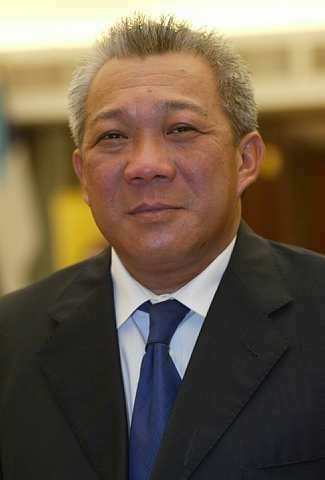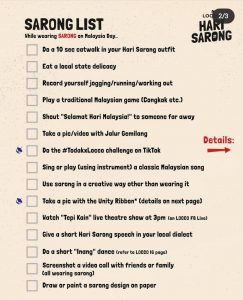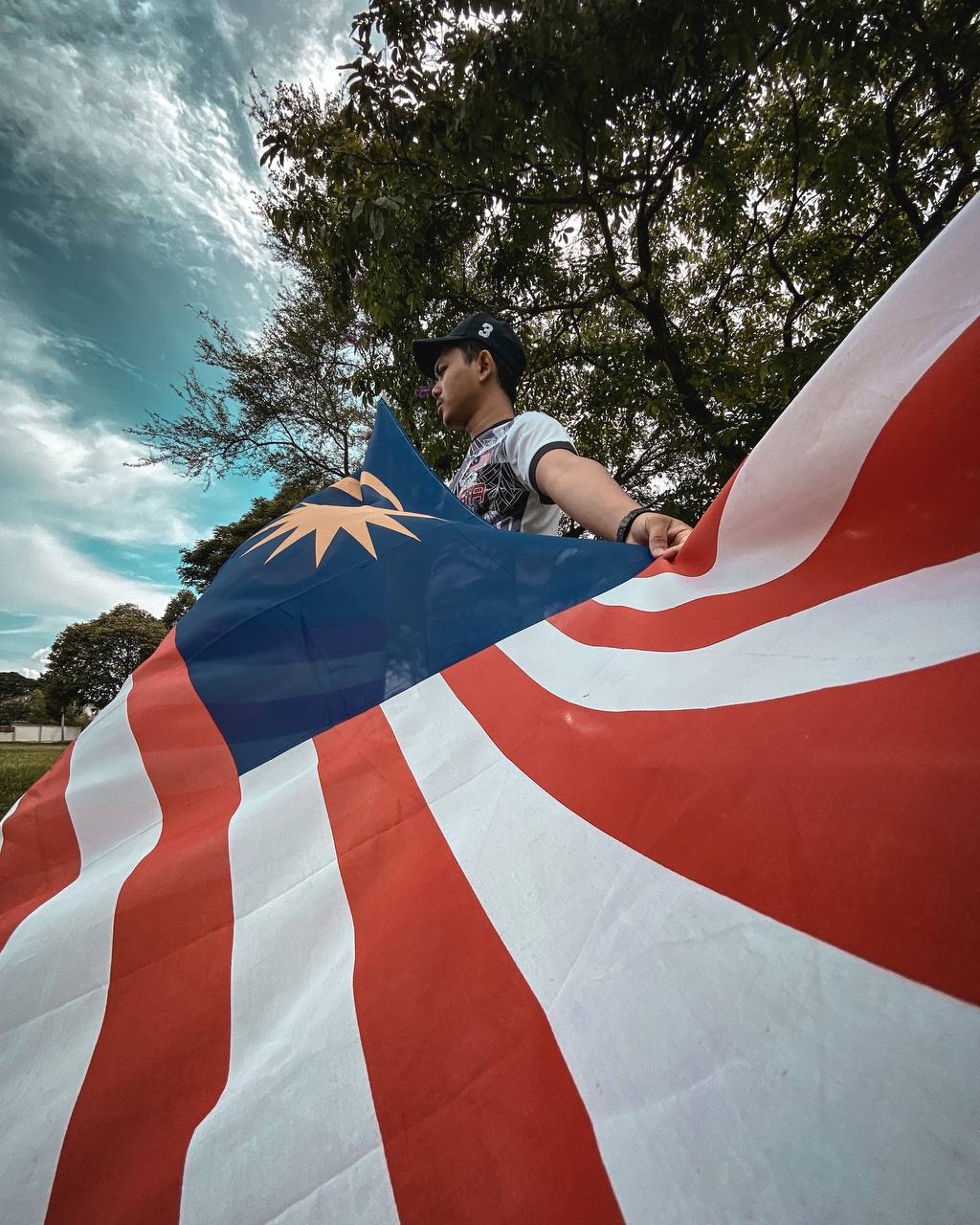By Marissa Nazeera
It has already been 58 years since the formation of Malaysia and 64 years of the country’s Independence. But are we really united though? Oftentimes, there is always a stigma that looks down on the Eastern Malaysians and how they are described as living on trees or are still living in the 1930s without any technology and malls.
Martin Luther King, Jr once said “I refuse to accept the view that mankind is so tragically bound to the starless midnight of racism and war that the bright daybreak of peace and brotherhood can never become a reality.”

Picture is credited to @rif_syawal and @_ammarisme
Some 55% of students rejected the idea of giving other ethnic groups equal opportunities to enter university. This is reflected in the article titled “Ethnic Acceptance Issues amongst Sabah and Sarawak Ethnic Groups at Sultan Idris Education University” following a survey conducted by Khairul Azam Bahari, Samsudin Suhaili, Norliza Jamaluddin, Kalsum Omar, and Zulkarnin Zakaria. The authors also highlighted how students from minority ethnics are at a disadvantage of enjoying an equal opportunity and a just treatment in their own country.
Not many of us think so, but there is a portion of Malaysians who are still thinking like that in the 21st century. As much as we wish it is only a joke, it does happen and has hurt the feelings of our fellow Malaysians. So, what is the yardstick of our unity when there is an ethnic and racial polarisation? For a country, with people rich in different culture, ethnicity and religion as well as with diverse socio-economic backgrounds, how can it unite every one as a true Malaysian at heart?
Overcoming the Issue
Firstly, we should take a step back and reevaluate ourselves. Do we really respect everyone regardless of their skin colour, the language they speak, and the food they eat? This is every parents’ first task as they are the first teachers to teach their children to have mutual respect and always do good to others. Most of the time, we forget to instil the importance of respect and adab at a very young age. Thus, it leads to the children growing up as someone who is racist and a bully.
Nevertheless, it also calls for the Ministry of Education to offer more opportunities for students to learn languages of other natives. This is also a wise move to ensure every single Malaysian is not only able to speak in their mother tongue and English, but also able to speak in other languages used in the country. Through language, it allows us to understand better and to instil a sense of camaraderie. Not to forget, it is equally important for everyone to be able to communicate using Bahasa Malaysia, the national language to prevent a greater psychological and racial barrier. Bahasa Malaysia should be the language that unites every one regardless of their ethnicity.
However, what is really very important is religious and racial tolerance. After all, every religion encourages its followers to always respect everyone irrespective of their religion. Now is the time for all to start viewing everyone as an equal human being before any of the differences that we have. Through this way, we can level up and treat everyone equal and even better.
Sabah and Sarawak
People have always looked up on Sabah and Sarawak as a great role model for unity and harmony. The two states are well-known for its multi-ethnicity with Sabah having more than 30 ethnics while Sarawak has almost 26 ethnic groups. Therefore, as the blueprint suggests, the states have managed to achieve unity by setting aside the differences between each and every ethnicity.
However, it is quite nonsensical to romanticise the unity in both states even in the 21st century as the two states are still at risk of continuing to remain under-developed. This specific issue had been raised by the Member of Parliament for Kinabatangan, Datuk Seri Bung Moktar who criticised how his state, Sabah, is still left behind in terms of access to clean water and proper electricity.

Debating on the Royal Address in the Dewan Rakyat recently, Bung Moktar questioned how certain districts in Sabah are still prone to flood making the roads inaccessible during heavy rainy days. Such a serious problem should be tackled quickly as it is also the people’s basic human right to live in a pleasant and developed area.
The state is also facing a serious issue with the undocumented water people, especially from the Bajau Laut ethnic. It is critical as stateless persons they are deprived of the state protection. Furthermore, they are also not safeguarded by any basic rights that any citizen should have.
Even worse, both states have a pitiful healthcare system during the pandemic. During the parliamentary session, the previous Health Minister, Dr. Adham Baba mentioned there is only a doctor for at least 682 patients in Sarawak. This is a clear imbalanced allocation of medical practitioners in the state.
Also as stated in an article published by TVS on 17 September 2021 titled,”Sarawak memerlukan lebih 1800 pakar bagi menampung hampir 8 juta populasinya.” In the article, the Deputy Health Minister II, Datuk Aaron Ago Dagang said there is only 532 medical practitioners allocated which is totally not enough for the state population.
What the pandemic had taught us
Also during the COVID-19 pandemic, it enables us all to witness where Malaysians unite as one and have been helping one another. They have also launched a movement called Kita Jaga Kita, whereby everyone ensures the sustainability of others in terms of food and social security. Although this is a simple act, it means a lot to everyone. Many concerned Malaysians keep on donating their money without questioning ones background just to help those who are in need.

Not only that, Locco.My which started the first initiative of Keretapi Sarong has adapted to the new normal to celebrate Malaysia Day. The Keretapi Sarong was initially started by the founder as it is an easy celebration that includes everyone irrespective of their age, race and religion. Everyone is asked to wear their own kain pelikat or even kain batik to the LRT location, but this year, it is done virtually.

This year, the Locco.My has prepared a Sarong checklist for all Malaysians to complete on Malaysia Day. The checklist includes a 10 second catwalk in sarong outfit, to eat local state delicacies, to do a short inang dance and many more. Everyone is required to complete at least eight items and to upload it on their social media accounts to win prizes. Not only a mere way to educate the public, but it makes it interactive and meaningful at the same time.
Even through these two events, it can simply picture how unity can be easily achieved by Malaysia as long as there is mutual respect, racial tolerance and a great education.
Patriotism and Unity
After all, what matters the most is for us all to unite and build a better Malaysia. A country where all of its people including the migrants are treated respectfully because it is a great indicator of a civilised society. It is also one of the causes that could break the country’s unity into halves.
To be patriotic means a demonstration of one’s love for the country, and also their loyalty to the principles of justice and democracy. Having said that, we must also bear in mind that if there is no unity, there may be no justice. It is because only through justice one may experience equal chances, inclusive participation and equity in the country. If one truly stands by the right definition of patriotism, then they will also unite together to ensure all of its principles are being upheld.
Former Prime Minister, Tun Dr. Mahathir Mohamad once said, œ…. Malaysia is our country, the country of the Malays, the Bumiputras, and Malaysians of Chinese origin, Indians, Ibans, Kadazans and other ethnic groups. Hence, if there is no unity among all of us, would there be any Malaysia? ***
